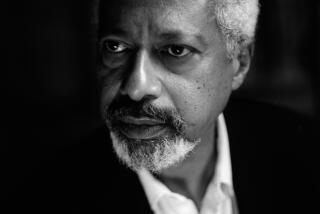Another People Suffering Under ‘Nation of Masters’ : East Timor: ‘Fighting communism,’ Indonesia creates conditions equal to the worst traits of the collapsed movement.
- Share via
I grew up in Poland, but I did not expect anything in East Timor to remind me of that. I was wrong: From the first moments after landing, the place smacked of something eerily familiar.
Contrary to my other missions for Human Rights Watch, I was sent to East Timor not because of any expertise but rather because I happen to speak Portuguese; until a bloody invasion by Indonesia in late 1975, East Timor was a Portuguese colony.
Last November, the capital city of Dili was the scene of a brutal massacre in which Indonesian troops fired on a peaceful pro-independence procession at the local cemetery. The official estimates put the number of dead at 50, but nearly twice that number are still missing. There were at least 90 seriously wounded, of whom some were still in the hospital more than two months later. More than 30 participants in the demonstration were arrested in the immediate aftermath and are awaiting trial, including some on charges of subversion, with a possible death sentence.
Massacres and political trials are nothing new in East Timor. Since 1975, between 100,000 and 200,000 people have died, either through executions or because of famine resulting from forced repatriation and the destruction of the local subsistence economy. For years, obtaining any information about East Timor was extremely difficult, because the area was closed not only to foreigners but to Indonesians as well; all communications with the outside world were strictly controlled.
The November massacre became news around the world precisely because a few Western tourists were in Dili that day, and more notably, because four Western reporters were on the scene. The reporters were fired upon, beaten and intimidated; a New Zealand photographer was shot and left to bleed to death and an American reporter sustained a fractured skull.
East Timor was officially “opened” three years ago, but not for the Timorese: All the opening means is that now you can travel into East Timor as a tourist from Indonesia.
Looking like tourists was not difficult, since Sidney Jones, the director of Asia Watch, and I were the only two Westerners on the flight. The moment we stepped off the plane, some young men sitting in front of the terminal snapped our pictures.
We had no illusions about our hotel, either: Everyone working there is believed to have an additional job with the security service. We were constantly asked questions about ourselves, or our plans for the next hours or our movements in the preceding hours; when one of us tried to use the phone in the lobby, three men appeared out of nowhere and positioned themselves within earshot.
Streets in Dili were almost always deserted even during the day; few people were about after dark. The military, however, was evident in large numbers virtually everywhere.
We took a bus trip to a town about five hours away from the capital. Passengers were standing in the aisles and overflowing out the doors. There was one empty seat, however, for almost the entire trip, next to an Indonesian army captain.
Talking to strangers turned out to be a dicey proposition. Most Timorese we came upon were reserved and not eager to talk at all. If someone did want to talk, our immediate thought was “a spy.” Even worse, if the person was not a spy, but just being pleasant, then talking to us might prove harmful.
Because I spent most of my life in a communist country, checking to see if one is being followed, having phone conversations monitored or taking for granted that hotel employees are informers was nothing new to me.
There was something else in East Timor that seemed familiar, although at first I could not put my finger on it. Only upon my return, as I was reviewing my notes (which, for security reasons, I took in Polish, carefully avoiding any names) did I notice that referring to the Indonesians in East Timor I inadvertently used the expression Poles often used when referring to Germans during the Nazi occupation, one that can roughly be translated as “the nation of masters.”
The Indonesians present in Timor are not just the military. Almost all civil servants above a certain level are non-Timorese, usually from Java. The two judges we spoke to in the court were from elsewhere; none of the three lawyers in East Timor is a local, and all teachers in a school we visited were Indonesian. All the better houses in Dili appear to be occupied by Indonesians. The local people live in overwhelming poverty, most of them in the villages in the interior, under the watchful eye of the troops.
An eyewitness to the November massacre, who saw soldiers kick a wounded man until he stopped moving, told us that when he protested, an officer answered that he should not care because all the soldiers were doing was fighting communists.
The East Timorese have already been living for several years under conditions like the worst characteristics of communism: omnipresent surveillance, lack of freedom of movement, constant fear of informers in every group and the absence of fundamental human rights.
Now that communism itself has collapsed in so many places, its distinctive ethos appears to persist mainly in the pervasive repressive techniques used by regimes that still claim to be fighting it.
More to Read
Sign up for Essential California
The most important California stories and recommendations in your inbox every morning.
You may occasionally receive promotional content from the Los Angeles Times.












